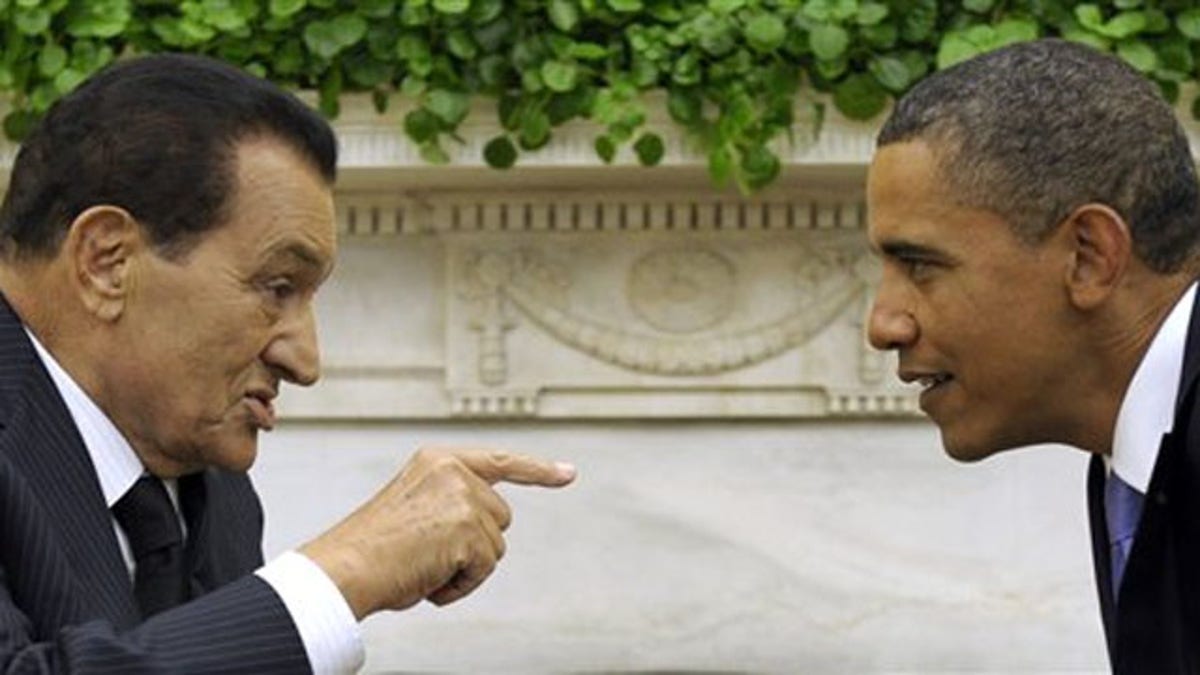
In this Sept. 1, 2010, file photo, President Obama meets with Egyptian President Hosni Mubarak, in the Oval Office of the White House in Washington. (AP)
The U.S. has increasingly worked behind the scenes at the highest levels after days of civil unrest in Egypt, with President Hosni Mubarak's Tuesday announcement he would step aside coming on the heels of prodding by a special U.S. envoy.
And after Mubarak told his country he wouldn't run for re-election later this year, he spoke with President Obama for a half hour by phone. Obama later said Mubarak recognizes that the status quo in Egypt is “not sustainable” and a “change must take place.”
Obama pointed out that historically Egypt is no stranger to governmental change and that the “voices of the Egyptian people tell us that this is one of those moments.”
Obama called on Egypt to form a responsive government where “broad spectrums of Egyptian voices are heard,” and he affirmed U.S. interest in a strong relationship with Egypt going forward.
The Mubarak regime for decades has been allied with the U.S., but since the outset of the demonstrations the Obama administration made clear that it was not taking sides. Yet it sent former U.S. ambassador to Egypt Frank Wisner, a close friend with the embattled leader, to persuade Mubarak not to run for re-election.
Late Tuesday, Mubarak said in a national address he would end his career "for the sake of the nation" and use his remaining months in power to work toward a "peaceful transition of power."
Mubarak had harsh words for the political forces he alleged had "manipulated and controlled" the protests, which began a week ago -- but he said he would remain in Egypt and that his legacy would be "judged by history."
Whether Mubarak's decision will placate demonstrators remains to be seen. John Bolton, former U.S. ambassador to the United Nations, said the test for Egypt will be whether the Egyptian demonstrators accept Mubarak as their president through the end of the year. Otherwise, he said, the country could be thrown back into crisis.
But the Obama administration has been holding talks to make clear Washington's desire for a peaceful transition, according to State Department spokesman P.J. Crowley. U.S. Ambassador to Egypt Margaret Scobey met with opposition leader Mohamed ElBaradei in Cairo to convey that message. Crowley described the meeting as "part of our public outreach to convey support for orderly transition in Egypt."
At the Pentagon, officials said Defense Secretary Robert Gates conferred by phone with his Egyptian counterpart, Field Marshal Hussein Tantawi.
Also Tuesday, the State Department ordered nonessential U.S. personnel to leave Egypt. The order replaces an initial decision last week to allow nonessential workers who wanted to leave the country to do so at government expense.
The department said it would continue to evacuate private U.S. citizens from Egypt aboard government-chartered planes.
As the protests against Mubarak's three-decade rule escalated on Tuesday, the chairman of the powerful Senate Foreign Relations Committee, Sen. John Kerry, a Democrat, was among the first to publicly say that Mubarak should "step aside gracefully to make way for a new political structure."
"It is not enough for President Mubarak to pledge `fair' elections," Kerry wrote in The New York Times. "The most important step that he can take is to address his nation and declare that neither he nor the son he has been positioning as his successor will run in the presidential election this year. Egyptians have moved beyond his regime, and the best way to avoid unrest turning into upheaval is for President Mubarak to take himself and his family out of the equation."
Egypt's army leaders are reassuring the United States that the powerful military does not intend to crack down on demonstrators, but is instead allowing the protesters to "wear themselves out," according to a former U.S. official in contact with several top Egyptian army officers.
The Egyptian officers expressed concern with some of the White House statements that side with the protesters, saying that stoking revolt to remove Mubarak could create a vacuum that the banned but powerful Muslim Brotherhood could fill, the official said. While the Brotherhood claims to have closed its paramilitary wing long ago, it has fought politically to gain power, and more threatening to the Mubarak regime, has built a nationwide charity and social network that much of Egypt's poverty stricken population depends on for its survival.
Col. David Lapan, a Pentagon spokesman, said the U.S. military remains ready to help get Americans out of Egypt if asked but so far has received no requests.
On Monday, the U.S. evacuated more than 1,200 Americans from Cairo on such flights and said it expected to fly out roughly 1,400 more in the coming days. Monday's flights ferried Americans from Cairo to Larnaca, Cyprus; Athens, Greece; and Istanbul, Turkey. On Tuesday, the department expects to add Frankfurt, Germany, as a destination.
It also hopes to arrange evacuation flights from the Egyptian cities of Aswan and Luxor.
The Associated Press contributed to this report.




